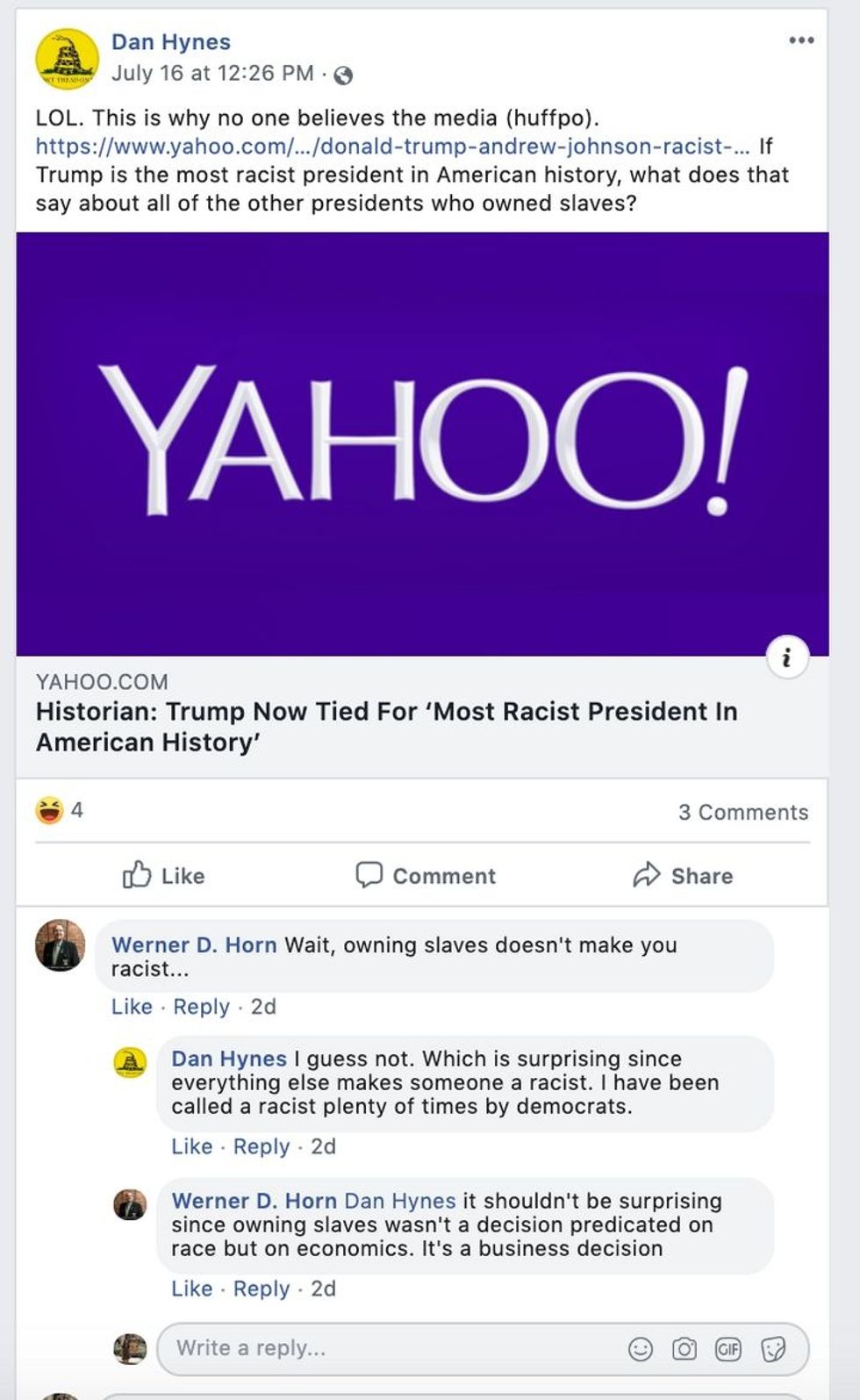People were horrified this week at blatantly racist tweets from President Donald Trump, which ultimately led to even more racist chants from his supporters at a recent rally.
If you find yourself asking, "How can lawmakers think this is acceptable?," then you probably don't want to see this recent Facebook comment from a Republican New Hampshire state representative.
Werner Horn represents Merrimack, District 2 of New Hampshire.
While we're not exactly familiar with the constituency there, we imagine most Merrimackians would have a problem with their representative claiming slavery wasn't rooted in racism.
But that's exactly what Horn did.

On a former New Hampshire state representative's Facebook post mocking criticisms of Trump's racism, Horn commented:
"Wait, owning slaves doesn't make you racist..."
His reasoning?
Economics.
"It shouldn't be surprising since owning slaves wasn't a decision predicated on race but on economics. It's a business decision."
The Western slave trade, after the Indigenous peoples of the Americas proved to be an insufficient slave labor pool, relied on kidnapping Africans, who were considered by White colonists to be subhuman, and forcing them on a treacherous journey to the Americas, where they would then be put to work as property. It was illegal to teach them to read or write or any other skill that didn't serve the sole purpose of performing labor for their masters.
It's estimated that millions died as a result.
"My comment specifically was aimed at a period of time when that was how you survived, that's how you fed your family," Horn told the Huffington Post.
"It wasn't 'I want to own a Black person today.' It was, 'I need to feed my family; I need five guys who can work stupidly long hours in the sun without killing themselves."
While Horn is correct in the assertion that slavery as a global practice throughout humankind's history hasn't always targeted Africans, to say that racism experienced throughout American history isn't rooted in slavery, or that slavery—especially in America—wasn't dictated by one's melanin is an inaccurate, reckless assertion.
During slavery, Black people were only considered three fifths of a person by the government. Segregation continued for a century after, in an effort to cement America's subjugation of Black people that began with slavery.
People were quick to call out Horn's ignorance.
What a mess.
The issue for Werner Horn and many others with similar views are an ignorance of United States history based on a biased education that focused on myths and lies to preserve an attitude of American exceptionalism. But the truth of US history can only help people not make the same mistakes or make ignorant comments.
The critically acclaimed, award-winning book A People's History of the United States, available here, covers the unvarnished truths of American history based on extensive research and documentation.














 @DuncanCecil/X
@DuncanCecil/X @@realDonaldTrump/Truth Social
@@realDonaldTrump/Truth Social @89toothdoc/X
@89toothdoc/X @xray_media/X
@xray_media/X @CHRISTI12512382/X
@CHRISTI12512382/X
 @sza/Instagram
@sza/Instagram @laylanelli/Instagram
@laylanelli/Instagram @itssharisma/Instagram
@itssharisma/Instagram @k8ydid99/Instagram
@k8ydid99/Instagram @8thhousepath/Instagram
@8thhousepath/Instagram @solflwers/Instagram
@solflwers/Instagram @msrosemarienyc/Instagram
@msrosemarienyc/Instagram @afropuff1/Instagram
@afropuff1/Instagram @jamelahjaye/Instagram
@jamelahjaye/Instagram @razmatazmazzz/Instagram
@razmatazmazzz/Instagram @sinead_catherine_/Instagram
@sinead_catherine_/Instagram @popscxii/Instagram
@popscxii/Instagram
